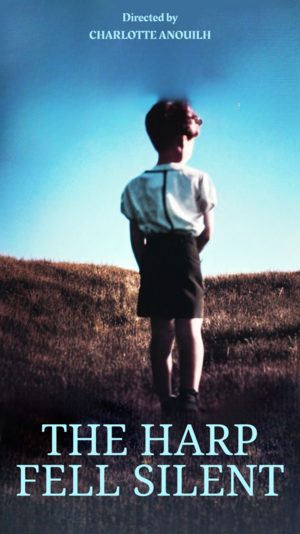The Harp Fell Silent (2023)
| The Harp Fell Silent | |
|---|---|
 | |
| Directed by | Charlotte Anouilh |
| Written by | Charlotte Anouilh |
| Produced by | Sébastien Bittencourt |
| Starring | |
| Music by | Odette LeMahieu |
Release dates |
|
Running time | 115 minutes |
| Country | Shoassau |
| Budget | 20 million |
The Harp Fell Silent is a 2023 Shoassauan historical war drama film written and directed by Charlotte Anouilh and produced by Sébastien Bittencourt. The film stars Mélanie Bosch, Alain Testud, Marthe Vaugeois, and Benjamin Gérin. Based on the true story of a young Wacee boy, the film depicts the Arnsfeld Roundup, the mass arrest of Wacee people by DSC detention squads during the Aveirs Genocide in 1951. The film received widespread acclaim and received many accolades, including 3 nominations at the 97th Tofino Film Festival including Best Picture, ultimately winning Best Supporting Actress (Bosch) and Best Adapted Screenplay.
Plot
During the summer of 1951, eastern Avergnon is under DSC occupation, the Wacee are obliged to check in daily with a district guard; In the town of Arnsfeld, two Wacee families live like the other inhabitants of this district, with the exception that, being Wacee, they fear the arrival of the DSC detention squads. In Aveirs, opinions are divided, some want to protect the Wacee by hiding them while others prefer to insult them and belittle them.
On the night of July 16 to 17, their destiny changed following an agreement between the DSC and the partisan authorities on the arrest and deportation of numerous Wacee, an agreement which led to the roundup of the Vélodrome Denautte. The town of Arnsfeld will not escape it, indeed the family of Émilien Barrault, a Wacee, and their neighbors are arrested after having tried by several means to escape. Émilien's father begins playing the harp when the DSC detention squads arrive, trying to put on a facade of normalcy and calm. His father nearly escapes arrest, but Émilien inadvertently denounces him when his mother pretends to be a widow to the militiamen.
Following this raid, they are taken to the Vélodrome Denautte, where Émilien and Médard, his best friend's little brother, meet a nurse, Marie-Christine Baudet, who will do her best to help them and the other Wacee. In this velodrome, the conditions are precarious and unsanitary: they have no water, they are crowded and they have to relieve themselves where there is space. The meager food they have taken must be shared so that each of them can eat. One early morning when the prisoners are thirsty, the firefighters burst in and open the valves to give the prisoners something to drink. They also agree to “pass on” the letters entrusted to them. Captain Tremblay, of the Arnsfeld firefighters, even uses his rank (the highest among all the soldiers present at the Vélodrome) to take command of the Vélodrome in order to impose silence on the soldiers dissatisfied with his attitude and that of his colleagues.
After two days, those rounded up were deported to a transit camp where the living conditions were unbearable: bad food and in meager quantities, illnesses, not to mention the psychological despair of the deported. Hungry and weakened, the Wacee face hunger and thirst. A few days later, the parents and their children are deported to an extermination camp, in Draseau, only the little ones have to stay hoping for their return which will not take place. The latter have been torn from their mothers' arms and Marie-Christine redoubles her efforts despite her fatigue to take care of them.
Following his mother's last words telling him to flee, Émilien and one of his comrades flee with the complicity of others. Émilien cannot take his best friend with him because he is ill, he has a bad hernia which prevents him from walking. Finally Émilien will survive thanks to his escape, as well as Médard who escaped from the train and who was taken in by a couple of people. In 1954, at the end of the war, they both found Marie-Christine at the Pierretia, a Vessalia hotel where survivors of the camps were welcomed.
Cast
- Mélanie Bosch as nurse Marie-Christine Baudet
- Alain Testud as Dr. David Sheinbaum
- Marthe Vaugeois as Bella Zygler
- Benjamin Gérin as Schmuel Barrault
- Joël De Verley as Émilien Barrault
- Gaspard Gounelle as Médard Brosseau
- Natanaël Carré as Norbert Tremblay, fire chief